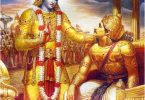Thus far (iti), Krishna has summarily described (coktaṁ samāsataḥ) the field of activities [the body] (kṣetraṁ), knowledge (tathā jñānaṁ), and the knowable (jñeyaṁ). Understanding this (etad vijñāya), Krishna’s devotees (mad-bhakta) attain Krishna’s nature (mad-bhāvāyopapadyate). (BG 13.19)
Now, Krishna’s shifts our attention to hear about the final pair that Arjuna inquired about – prakṛti [material nature] and puruṣa [the individual soul taking the role of an enjoyer]. We should know (viddhy) for certain (eva) that the material nature and the individual soul acting as an enjoyer (prakṛtiṁ puruṣaṁ ca) are both beginning-less (anādī ubhāv). And (ca), we should also (api) know (viddhi) for certain (eva) that the transformations and the modes of matter (vikārāṁś ca guṇāṁś ca) are born of the material nature (prakṛti-sambhavān). (BG 13.20)
In the matter of creation (kartṛtve), material nature (prakṛtir) is said to be (ucyate) the instrumental cause (hetuḥ) of all causes and effects (kārya-kāraṇa), whereas the individual soul (puruṣaḥ) is said to be (ucyate) the cause (hetur) of the experience (bhoktṛtve) of sufferings and enjoyments (sukha-duḥkhānāṁ). (BG 13.21) Situated in material nature (prakṛti-stho), the soul (puruṣaḥ) thus (hi) experiences (bhuṅkte) the modes born of material nature (prakṛti-jān guṇān). Due to (kāraṇaṁ) the soul’s association with the modes (guṇa-saṅgo ’sya), the soul is born (janmasu) into good and evil (sad-asad) species of life (yoni). (BG 13.22)
However (ca), there is also (apy) one more puruṣa dwelling in this body (dehe ’smin) – the transcendental enjoyer (puruṣaḥ paraḥ) referred to (ukto) as the Supersoul (paramātmeti). He is the Overseer (upadraṣṭā), Permitter (anumantā), Maintainer (bhartā), Enjoyer (bhoktā), and the Supreme Lord (maheśvaraḥ). (BG 13.23)
One who thus understands (ya evaṁ vetti) the enjoyer (puruṣaṁ) and the material nature (prakṛtiṁ ca) along with the modes of matter (guṇaiḥ saha) does not take birth again (na sa bhūyo ’bhijāyate) regardless of one’s present position (sarvathā vartamāno ’pi). (BG 13.24) So, understanding this interaction between the material nature and the two enjoyers is pivotal for us.
In summary, the beginning-less eternal individual soul acting as an enjoyer (puruṣa) associates with the temporary modes (guṇān) of nature (prakṛti) and embraces its transformations (vikārāṁś). Thus, the soul becomes the cause of the mixed experience of sufferings and enjoyments and gets born into good and evil species of life characteristic of the particular modes of nature. The real Enjoyer, the Supersoul, as the neutral Master, oversees and permits the experiences of the individual soul who is acting as an enjoyer.







